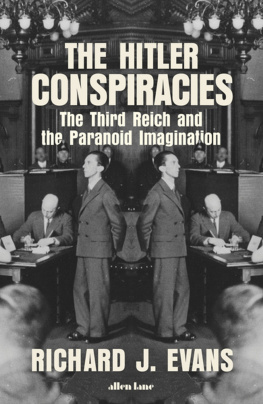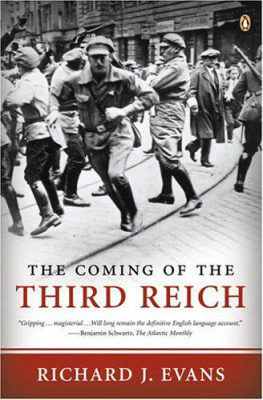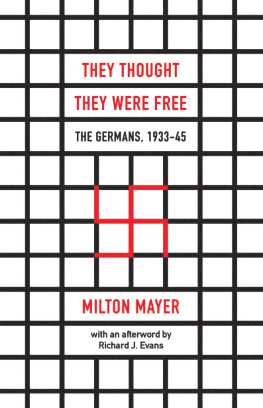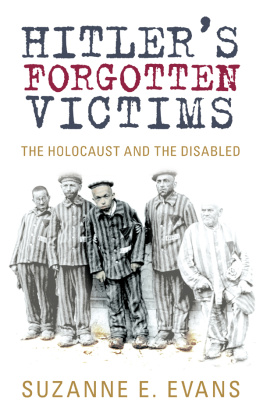Richard J. Evans - The Hitler Conspiracies
Here you can read online Richard J. Evans - The Hitler Conspiracies full text of the book (entire story) in english for free. Download pdf and epub, get meaning, cover and reviews about this ebook. year: 2020, publisher: Penguin Books Ltd, genre: Religion. Description of the work, (preface) as well as reviews are available. Best literature library LitArk.com created for fans of good reading and offers a wide selection of genres:
Romance novel
Science fiction
Adventure
Detective
Science
History
Home and family
Prose
Art
Politics
Computer
Non-fiction
Religion
Business
Children
Humor
Choose a favorite category and find really read worthwhile books. Enjoy immersion in the world of imagination, feel the emotions of the characters or learn something new for yourself, make an fascinating discovery.
- Book:The Hitler Conspiracies
- Author:
- Publisher:Penguin Books Ltd
- Genre:
- Year:2020
- Rating:4 / 5
- Favourites:Add to favourites
- Your mark:
- 80
- 1
- 2
- 3
- 4
- 5
The Hitler Conspiracies: summary, description and annotation
We offer to read an annotation, description, summary or preface (depends on what the author of the book "The Hitler Conspiracies" wrote himself). If you haven't found the necessary information about the book — write in the comments, we will try to find it.
The Hitler Conspiracies — read online for free the complete book (whole text) full work
Below is the text of the book, divided by pages. System saving the place of the last page read, allows you to conveniently read the book "The Hitler Conspiracies" online for free, without having to search again every time where you left off. Put a bookmark, and you can go to the page where you finished reading at any time.
Font size:
Interval:
Bookmark:


Richard J. Evans is the author of a number of major books, including In Defence of History, The Coming of the Third Reich, The Third Reich in Power, The Third Reich at War and The Pursuit of Power. His most recent book is the biography of Eric Hobsbawm. From 2008 to 2014 he was Regius Professor of History at Cambridge, where he also led a five-year Leverhulme research programme on conspiracy theories and their impact on democracy. He was knighted in 2012 for services to scholarship.
For the Conspiracy and Democracy Team
Protokolle der Weisen von Zion: Die grte Flschung des Jahrhunderts! (The Protocols of the Elders of Zion: The Greatest Falsehood of the Century!) edited by Johann Baptist Rusch from a manuscript probably written by the prominent Swiss Zionist Saly Brauschweig, published in Switzerland, 1933. Private collection.
Der Dolchstoss (The Stab in the Back): front cover of the right-wing German nationalist magazine Sddeutsche Monatshefte, published in Munich, April 1924. akg-images/Alamy.
Tract published in 1933 by Adolf Ehrt, presenting the Reichstag Fire as the product of a conspiracy to establish the rule of Jewish Bolshevism in Germany. Ehrt ran the office for defence against the Marxist-Communist atheist movement in the press service of the German Evangelical Church. The man in the cloth cap on the right of the illustration is Marinus van der Lubbe, who was arrested at the scene of the fire. Private collection.
Debris of Rudolf Hesss Messerschmitt ME-110 at Floors Farm, Eaglesham, East Renfrewshire, Scotland, May 1941. The aircraft crashed after Hess had bailed out. Hulton Archive/Getty Images.
Likenesses of Adolf Hitler produced in June 1944 by Eddie Senz, a make-up artist, for the US Office of Strategic Services, to show how Hitler might be disguised in order to escape. UIP/Getty Images.
The idea that nothing happens by chance in history, that nothing is quite what it seems to be at first sight, that everything that occurs is the result of the secret machinations of malign groups of people manipulating everything from behind the scenes, is as old as history itself. But conspiracy theories seem to many to be growing more popular and more widespread in the twenty-first century, powered by the rise of the Internet and social media, enabled by the declining influence of traditional gatekeepers of opinion such as newspaper editors and book publishers, and encouraged by the spread of the uncertainty about truth and falsehood encapsulated in the perverse concept of alternative facts.
Many years ago, the American liberal intellectual Richard Hofstadter drew attention to conspiracy theories in his celebrated article The Paranoid Style in American Politics, first published in Harpers Magazine in its November issue for 1964. Hofstadter was clear that he was not calling conspiracy theorists clinically deranged. Rather, he wrote: I call it the paranoid style simply because no other word adequately evokes the sense of heated exaggeration, suspiciousness, and conspiratorial fantasy that I have in mind. It was, of course, he noted, nothing new: it could be traced back to writing about groups such as the Freemasons or the Illuminati in the eighteenth century. But it had re-emerged in the twentieth, in particular in the form of McCarthyism after the Second World War. Senator McCarthys warped vision of clandestine Communists in every corner of American society was a classic example of the paranoid style, envisioning a malign, concealed enemy manipulating events in order to undermine the social and political order. Hofstadter continued:
Unlike the rest of us, the enemy is not caught in the toils of the vast mechanism of history, himself a victim of his past, his desires, his limitations. He wills, indeed he manufactures, the mechanism of history, or tries to deflect the normal course of history in an evil way. He makes crises, starts runs on banks, causes depressions, manufactures disasters, and then enjoys and profits from the misery he has produced. The paranoids interpretation of history is distinctly personal: decisive events are not taken as part of the stream of history, but as the consequences of someones will.
Paranoid writing displayed, he noted, a surprisingly high level of pedantry and pseudo-scholarship. One of the impressive things about paranoid literature, he wrote, is the contrast between its fantasied conclusions and the almost touching concern with factuality it invariably shows. It produces heroic strivings for evidence to prove that the unbelievable is the only thing that can be believed.
Since Hofstadter wrote, and particularly since the turn of the century, the assumption on which his essay was based that public discourse in general and political rhetoric in particular rested on a shared set of liberal values embodying rationality and rejecting the idea that hidden forces lay behind every major political event has come to seem to many commentators to have been overtaken by events. As Joseph Uscinski, a leading contemporary scholar in the field, has observed, conspiracy theories
have become a marker of the early twenty-first century. Conspiracy theories have dominated elite discourse in many parts of the world and have become the rallying cry of major political movements The Internet, once touted as an instrument of democracy, has been used to manipulate the masses for profit or power with fake news consisting mainly of conspiracy theories constructed out of whole cloth Our culture is awash in conspiracy theories.
Nowhere has the spread of conspiracy theories and alternative facts become more obvious than in revisionist accounts of the history of the Third Reich. Long-discredited conspiracy theories have taken on a new lease of life, given credence by claims of freshly discovered evidence and novel angles of investigation. At the centre of this world of conspiracy theories lies the figure of Adolf Hitler. Anyone who loves a good conspiracy theory will have heard a shed load about Hitler, as a student journalist recently noted. Hitler, indeed, is rarely absent from online discussions about almost anything. Already in 1990 the American writer Mike Godwin propounded what has become known as Godwins Law, namely that the longer an Internet discussion goes on, the more likely it is to mention Hitler, at which point it usually though not always comes to an end. By 2012 the term had even entered into the sacred linguistic halls of the Oxford English Dictionary. Comparisons with Hitler are everywhere, especially of course in the world of politics, where it is almost de rigueur to compare anybody of whom one disapproves to the Nazi dictator, from Donald Trump downwards. Why Hitler? As Alec Ryrie has written in his history of atheism and agnosticism:
The most potent moral figure in Western culture is Adolf Hitler. It is as monstrous to praise him as it would once have been to disparage Jesus. He has become the fixed reference point by which we define evil Nazism, almost alone in our relativistic culture, is an absolute standard: a point where argument ends, because whether it is good or evil is not up for debate Nazism has crossed the barrier separating historical events from timeless truths.
Next pageFont size:
Interval:
Bookmark:
Similar books «The Hitler Conspiracies»
Look at similar books to The Hitler Conspiracies. We have selected literature similar in name and meaning in the hope of providing readers with more options to find new, interesting, not yet read works.
Discussion, reviews of the book The Hitler Conspiracies and just readers' own opinions. Leave your comments, write what you think about the work, its meaning or the main characters. Specify what exactly you liked and what you didn't like, and why you think so.















